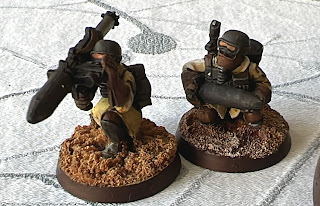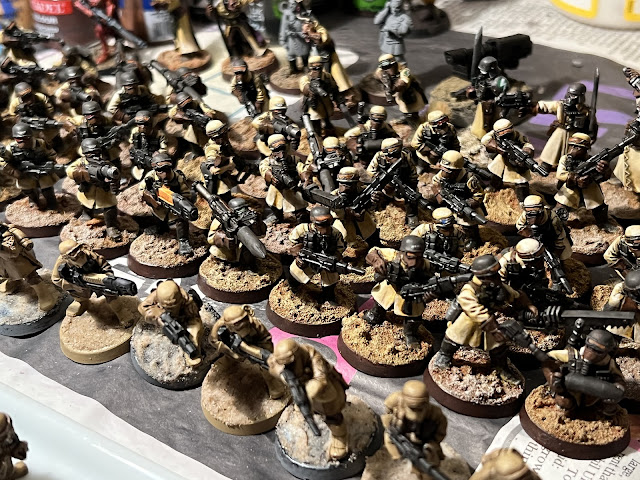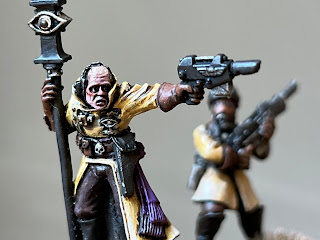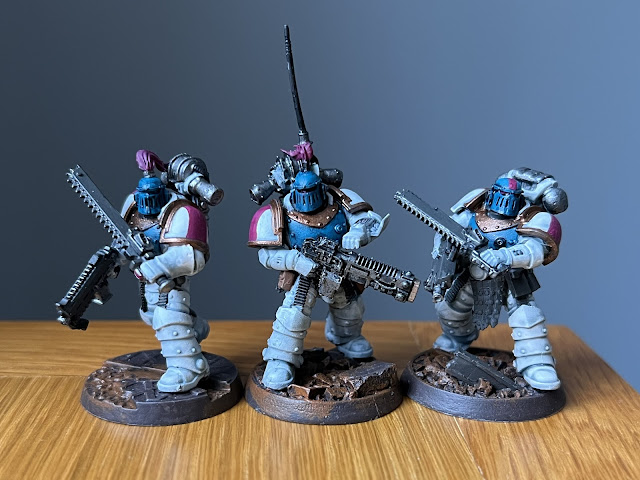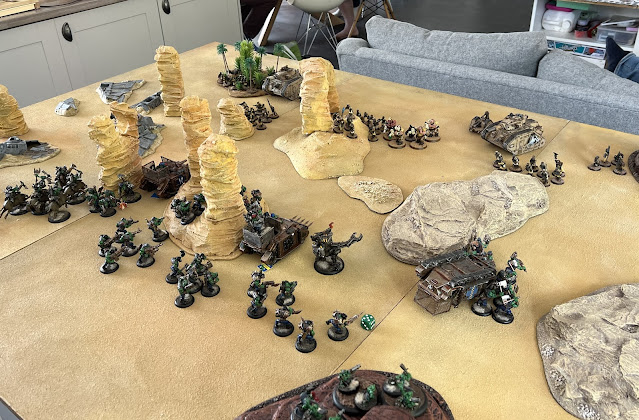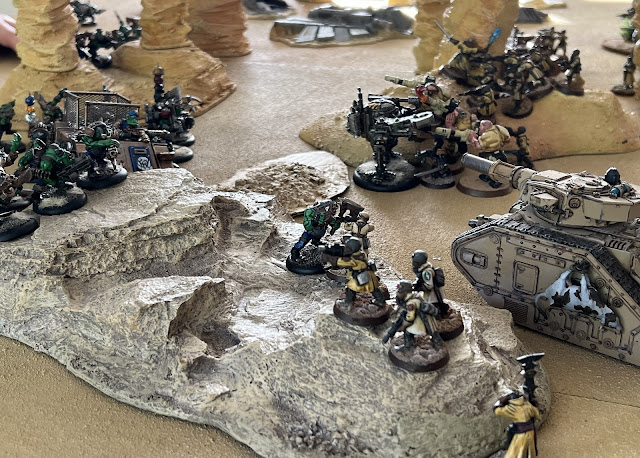+ Resupply: Seventh Army Group +
 |
| + A patrol from the 7th Army Group take on a mob of Goffs. + |
+ Known by those fighting it simply as 'The War', what would later be titled in Imperial histories as the Second War for Armageddon involved millions of Imperial Guardsmen and a colossal amount of kit. Some was imported from off-world, but for the most part, Armageddon's production capabilities were equal to the task. +
+ Today's inload looks at some extra equipment I've mananged to lay my hands on for my Steel Legion force. +
+++
+ History of the Steel Legion +
The Steel Legion release was a bit of a peculiarity, as was much to do with the Codex Armageddon supplement to 3rd edition 40k. The Codex was an interesting experiment from GW: rather than being focussed on a single army, it included extra units and rules allowing you to create Salamanders or Black Templars Space Marines forces; a Speed Freek specific list for the orks; and the mounted Steel Legion Regiment for Imperial Guard. In addition, it had lots of maps and background and ideas for fighting in the battlefields of this specific warzone. In many ways, it was the precursor to today's 'War Zone' campaign books.
The models were also a bit unusual, as they marked a transition between the metals of 2nd edition 40k and the plastics of 3rd edition. The full range – such as it is – can be seen here, on the Collecting Citadel Miniatures wiki [
+noosphericexloadlink embedded+]. When compared with the earlier metal ranges for the Guard (Valhallans, Catachans etc.), you'll spot the available Steel Legion are a bit thin on the ground. Sculpted by the Perry Twins, the models we did get are wonderfully characterful, as this typical lasgun sculpt shows.
In many ways the Steel Legion release was a bit of a last gasp of the metals. Unlike the previous Regiments, which were the de facto official kit for Imperial Guard, the Steel Legion were released after the plastic Catachan sprue and just a couple of years before the plastic Cadian sprue, and the way the wind was blowing, I think most contemporary gamers were beginning to see plastics as the future; so the Steel Legion always had a whiff of a stop-gap special release; a fun addition to the upcoming Cadians who would become 'the basic Guard'.
This feeling is emphasised by the small range. The earlier Regiments were (generally speaking) each released in two loose waves – an initial infantry box and officer followed up a couple of months later by a few alternative lasgun, special and heavy weapon sculpts, plus another sergeant and officer sculpt. The Steel Legion never received reinforcements of this kind, instead having a slightly larger single wave that included a couple of variant officers, a single extra special weapon and two heavy weapon teams.
In the weapons and equipment we can see this transition more clearly. The preceding metals all shared some universal equipment. The lasguns, water bottles, grenades and special/heavy weapons were shared universally across all the various ranges, from Mordian to Tallarn, as the examples of Catachan and Cadian lasguns below illustrates:
 |
| Catachan comm-link |
 |
| The lasgun here was universal for Guard across the range. |
 |
| A shot of various bits from the Cadian range – note the identical lasguns on the left; and examples of the universal plasma, flamer, melta gun and bolt pistol models, too. |
The Steel Legion (and much later, Vostroyans), differed here. They had a new unique pattern of lasrifle, which was clearly based on the then-current plastic Catachan lasgun. It had the same casing and slimmer, less cartoony barrel; but with less of the barrel exposed, and with a folding stock instead of a solid one:
The water bottle and other equipment had much the same signature as the older Perry sculpts, but were unique to the range. Little details like this make them stand out from the older Regiments, and presage what would come – though they remain a niche range. With just six lasgun sculpts, repetition is quick across an army.
More obviously, the Steel Legion got entirely new heavy and special weapons, which – to my eyes at least – were light years ahead of the clunkier old ones, and gave the Regiment a slightly more 'modern warfare' feel than the older equivalents.
The plastic Cadian range came out just three years later in 2003, and while the metals remained on sale, the Cadians quickly came to dominate. The Steel Legion therefore became a bit of a footnote in collecting history, but – as I hope you'll agree – the models are still lovely.
+++
+ What's new? +
Finding second-hand Steel Legion is now a challenge. Not only were they around for less time than the older metal Regiments, but their slim range of just two special weapons (grenade launcher and plasma gun) and three heavy weapons (missile launcher, lascannon and heavy bolter) was not evenly distributed – missile launchers and grenade launchers are very common, as they were packaged with the infantry squad; but the others are much rarer – and hence unfortunately tend to be prohibitively expensive.
You can still pick up some bargains, if you don't mind a bit of conversion work. The lascannon below was missing its crew, but a separate lucky find gave me one of them, and I converted a spare missile launcher gunner to act as a second member of the crew (at the back here) – a simple matter of cutting at the shoulder and wrist to have him holding a remote trigger while scanning the horizon.
 |
| The autosavant is trying to reconcile the non-standard crew – the body language says it all! |
Alongside these I managed to pick up a couple of plasma gunners and a spare heavy bolter gunner. He received the leftover missile launcher arm from the conversion above – a neat way to kill two birds with one stone, creating some visual variety in the limited poses available and also making use of spare parts.
You'll spot a second standard heavy bolter team and some plasma gunners, too; alongside some 40k weirdos (old Inquisition models) that I thought fitted the vibe of the force.
The PCRC are planning an old-fashioned event, where I'm hoping to get to field some or all of my Steel Legion, so I'll get to painting. If time, budget and skill allows, I'd like to have a go at creating some Steel Legion Rough Riders to go with the army, as a nod to those from the Battle For Armageddon boardgame.
... and apropos of nothing other than I liked them, I indulged in some Steel Legion-themed dice to go with the army, and some 'sustained fire' dice for our continuing 2nd edition games.
+++




